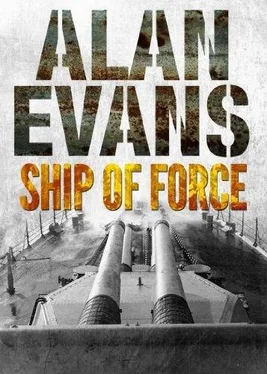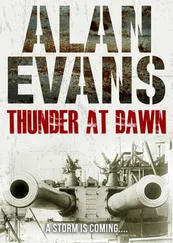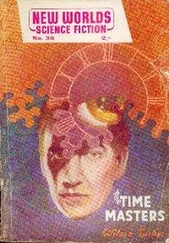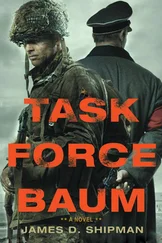Smith fell into the stern alongside Lorimer, sat down with a bang and gasped for breath, watching as the whaler backed off with the Vickers firing again, the line of tracers waving slowly back and forth like a warning finger, sweeping the crest of the dunes. Then the whaler spun on her heel and as Lorimer yelled “—together!” the oars dug in and she headed out to sea.
The Vickers was silent but a gun fired now from the crest of the dunes, it seemed right in their ears but it was about three hundred yards north. The shell screamed over the whaler and set them all ducking. Smith screwed his head around to peer at the shore receding behind him, the dunes fading into the darkness until only the line of surf marked the shore. The gun bellowed again, and again the shell was high. Rifle-fire came raggedly with flickering points of flame and the rattle of the reports coming flatly over the sea but the firing was blind and not a shot came near the whaler. He heard a whistle, faintly, and the firing stopped. Once more there was only the creak of the oars and the breathing of the men, the slap of the sea on the whaler’s stem.
His chest ached, his legs were weak and the muscles trembled with reaction. He felt sick. “Well done.” It was the least, the very least he could say to them but he could find no other words. He had taken appalling risks. It had been a mad, hare-brained operation…Or had it? They’d had surprise on their side, a huge factor, and he’d known that and felt there was a chance they could pull it off, known also that his conscience would plague him forever if he did not try it and simply left the woman to her fate.
The woman. Eleanor Hurst! He stared at her where she sat within arm’s reach but her arms were folded on her knees and her bent head rested on them so he could not see her face. He had questions to ask her, but not now.
His eyes went to the men. Young Lorimer, intent on the compass, its glow dimly lighting his face. Buckley, his bulk unmistakable forward by the Vickers. McGraw, Finlay, Galt. And the others tugging at the oars as if they were just starting, rowing a clean stroke while he sat exhausted. They had backed him all the way. He was lucky, lucky in his men.
Smith had the helm now. The boat crept on, moving in a darkly circumscribed little world of its own and all of them listening now until the sound came faintly but clearly across the sea: Dunk !.. Dunk - clunk !.. Dunk !..It was Smith’s improvised buoy and he steered in the direction of the sound, at first tentatively because sound plays tricks in its passage over water; it is not easy always to mark the direction of its source. But it grew stronger.
Smith asked: “Did you have any trouble finding the buoy?”
“No, sir.” answered Lorimer. That was true enough but he did not add that he had suffered an agonised minute before the buoy had made itself heard when he had sweated at the thought that he might miss it and lose the whaler in the North Sea. He had been glad of the stolid veteran seaman at his side, knew why Smith had set the man there and had suffered no injured pride. He had just been grateful and marvelled at Smith’s insight.
Smith said, “There it is.” The buoy was just a black lump swaying on the surface of the sea. As he eased the helm to bring the whaler’s bow on to it he asked, “You heard our firing and came in?”
“We heard that klaxon and thought there must be something up, sir. That was some time after the gun-fire and we thought that might have been from De Haan but it sounded more as if it came from the sea, nor-east by north.”
“Gun-fire?” Smith did not remember any gun-fire. “Heavy?”
“Just five or six reports, sir. That’s all. And some time after that we heard the klaxon.”
“Um.” Smith thought about it. “Oars!”
The oars came in and Buckley in the bow reached with the boat-hook and hooked on to the buoy. The whaler lay rolling gently in the sea. The men rested and rubbed forearms over sweating faces and panted.
Galt said, “I never knew you could run that fast, Hec.”
McGraw answered lugubriously, “Me neither! Must ha’ lost a stone!”
Soft, wheezing, breathless chuckling. Reaction was setting in.
But they were not clear of trouble yet, not by a long shot — and with the proximity of the shore batteries that phrase was apposite. Smith said, “Quiet. Keep a sharp look-out.”
Buckley was a hump in the bow where he squatted on his hunkers by the Vickers. Eleanor Hurst was slumped against Smith now, limp as if she slept but he could see her eyes wide.
He said softly, angrily, “What lunatic had this bright idea?”
She accepted now that the man was Smith. The man she had known. Still, she wondered at him, as she wondered at her own self-possession, surprised at how calm she was.
“What bright idea?”
“Putting you ashore to spy, of course.”
She stirred and sat a little straighter but still close. “I can’t tell you who he is but he isn’t a lunatic. He said he’d come to me because I knew the country and spoke the language like a native. He told me what he wanted me to do and explained the risks. I volunteered. And for the most part it was simple enough.”
“Simple!” Smith’s voice lifted and he saw the men staring at him.
Eleanor Hurst shrugged. “I won’t say I wasn’t frightened because I was; even in London when we — were together. A motorboat landed us last night, a Belgian met us and we crept up from the beach and only once saw a patrol before we got to his house. During the day we wandered about peering at the woods from a distance. We were stopped by patrols a couple of times but the papers we had were all right. It wasn’t till tonight that things became — complicated.”
Smith stared out at the dark sea. The boat rocked slowly and the buoy gave its reverberating dunk! dunk! dunk ! Where was Sparrow ? He fingered the torch. She was long overdue and the light was growing; when Buckley turned his head Smith could make out his features now. He would have expected Dunbar to be early. He was uneasy.
He asked, “What were you looking for?”
“I shouldn’t tell you, but we were just looking. We didn’t know what was in those woods and we never got a chance to find out.”
Smith said, “ Schwertträger .”
Her head snapped around, eyes wide. She whispered, “How did you hear that?”
Josef was also staring.
Smith answered, “How did you?”
He saw her exchange glances with Josef, saw the Belgian nod. She said, “The man who came to me. He said they’d had reports by carrier pigeon — they drop them to the Belgians by parachute, you know?” Smith nodded. “Well. He said they had reports of something called Schwertträger . It was secret and connected with the woods south of De Haan and the Germans had sealed them off.”
So somebody else knew about Schwertträger , or rather wanted to know about it. And someone had asked for reconnaissance flights over the woods.
The girl beside him shuddered — with the night’s chill? She said stubbornly, “It was worth a try. I thought it worth trying.”
But they had found nothing. What could it be? Some kind of tank? But why then would a U-boat commander be involved?
Josef said, “There was the train.” Smith looked at him questioningly and the Belgian went on, “The — people we contacted, they told us that the train, the light railway, you know? It has been leaving Zeebrugge with Army engineers and marines and loaded with crates and timber in big sections. It arrives empty at Ostende.”
Engineers — and marines?
He shifted restlessly. Where was Sparrow ? He looked at his watch again. Dawn would come soon to expose them on this empty sea to anyone on the shore and that would be the end of it. He was certain they were on station but if Dunbar in Sparrow had made a mess of his navigation he might be patrolling a mile away. But he could not believe that. Dunbar was an old hand…
Читать дальше












